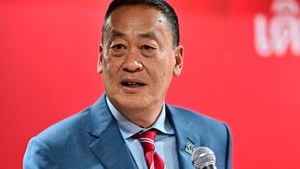The Social Democratic Party of Germany (SPD) faces mounting criticism from within its ranks following its historic defeat at the Bundestag elections held on February 23, 2025, where the party secured just 16.4 percent of the vote, marking its worst result since its founding, and the lowest percentage achieved by the party at any national parliamentary election since 1887.
Philipp Türmer, the head of the SPD’s youth wing, the Juso, took aim at the party's leadership, particularly Lars Klingbeil and Saskia Esken. On February 24, the day following the elections, Türmer did not hold back, declaring, “The entire campaign was one big stumble,” expressing dismay over the party’s performance throughout the election process.
With the SPD's poor showing, Türmer placed responsibility squarely on the shoulders of the party leadership, stating, “The responsibility for the defeat lies with party leaders Saskia Esken and Lars Klingbeil.” The criticism intensified around Klingbeil's announcement to assume the role of the parliamentary group leader, which Türmer condemned as inappropriate. He remarked, “Through this approach, the fatal impression arose: as the first reaction, one of the architects of failure reaches for the faction chairmanship.” Such sentiments reflect the urgency some party members feel for radical change.
The election outcome has understandably stirred turbulence within the SPD. Türmer emphasized the need for both programmatic and personnel restructurings within the party, stating, “This is the priority, and depending on this, there must be a personnel reshuffle.” These calls for reform come as the party grapples with what many see as not merely losing votes, but also losing its relevance and reputation among German voters.
The fallout of the election reflects broader discontent with the current leadership and campaign practices, which have been deemed ineffective by numerous party members. Türmer asserted, “This was not just a warning shot, it was a decisive blow,” underlining the need for the SPD to reassess its strategy and direction heading forward.
Despite the setbacks, some party leaders, including Esken, appear resolute. She has indicated her intention to continue leading the SPD, declaring her commitment to fostering unity and advancing the party’s core missions. Whether this steadfastness reflects the will of the broader party membership remains to be seen.
The SPD's current struggle is not just with its internal dynamics but also with the external political environment shaped by recent electoral changes. The aftermath of the election has rekindled discussions about revitalizing the party’s image and reconnecting with its base, particularly among younger voters—as represented by figures like Türmer, who demand change.
Looking forward, the SPD stands at a crossroads; the path it chooses to take will hinge on its leadership's willingness to adopt the reforms proposed by its younger members and the general electorate's response to those changes. If the party fails to adjust to its constituents’ expectations and societal dynamics, it risks rendering itself obsolete.
With the SPD's future uncertain, the party must engage proactively with its disenfranchised electorate if it hopes to reclaim its position as a leading political force within Germany. Acknowledging its failures and making bold decisions will be key to revival efforts, as emphasized by Türmer's significant critique.



